It’s Mental Health Week in Canada and I’ve got something to share. I wrote most of what follows in October 2015 but refrained from sharing it out of shame and fear of judgment. Though I have since realized that such kind of thinking has to end, it wasn’t until recently that I could get myself to express all my thoughts and feelings through this story.
Reading time: ~13 minutes
A bit of background from my previous post:
Duloxetine (Cymbalta or other generics) belongs to a class of medications called selective serotonin and norepinephrine reuptake inhibitors (SSNRIs). It is used to treat depression and generalized anxiety disorder. It can also be used to treat diabetes-related nerve pain, fibromyalgia, chronic low back pain, and chronic pain from osteoarthritis of the knee.
For depression and anxiety, duloxetine works by affecting the balance of chemicals in the brain and other parts of the body. For certain types of pain, duloxetine works by affecting the balance of chemicals in the brain and spinal cord that are involved in the experience of pain.
Source: Body and Health: Cymbalta
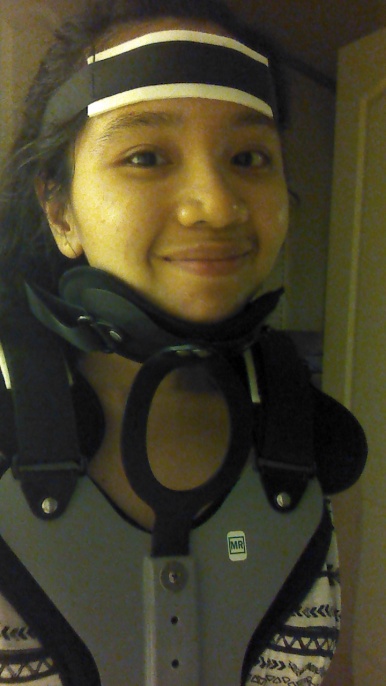
It was the morning of Thursday, August 27th, 2015, a few days before my planned surgery. I had an appointment to see my family doctor, Dr. K. Dr. K was a loud and quirky Indian lady in her 50’s who was a highly qualified family doctor.
In my morose mood, I told her the unsettling news of my nonunion. I was slated to get surgery by the following Monday at the earliest. As soon as she replied and voiced understanding, I burst into tears.
She asked, “Have you been taking the Cymbalta I gave you?”
“Umm, no… not anymore. I took it for like five days then stopped because I thought I didn’t need it anymore,” I said.
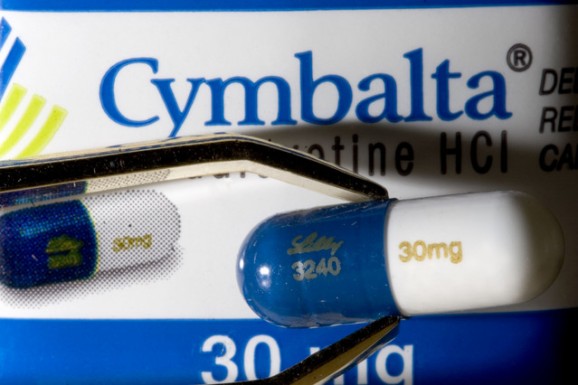
“Well, I really think you need it, honey,” she told me.
“I was scared of the side-effects…”
“Every single medication has side-effects. The dose I gave you is pretty low, you shouldn’t have any problems,” she countered.
“Umm, okay…” I whimpered.
“Anything else I can do for you, honey?”
Uncontrollably sobbing, I said, “Well, there’s still this rash under my chin because of my brace and it sucks…”
She gave me a cream on my previous visit, but it hadn’t worked. The Minerva jacket’s chin pad repeatedly touched, rubbed, and didn’t let my skin breathe that it caused a prickly rash to form.
“That’s really the least of your worries right now, but let me give you this stronger cream, okay?” she said.
Weeks later when I requested my medical records from the clinic, I found that Dr. K wrote the following about this visit:
… started Cymbalta but did not continue it. Still weepy.
After our meeting, I went straight to the pharmacy across the hall in the same building. I saw my friendly neighbourhood pharmacist, M, who was around 35 years old and always had a smile on his face. I had seen him many times before. When I visited his pharmacy several months earlier, I was complaining of lower back pain from my running and high-impact workouts.
He knew me as a cheerful, athletic person. And now I was walking to his counter wearing this unexpected contraption of a neck brace.
“Hi!” he said, as I came walking to the counter. He started to recognize me and said, “Oh my God, what happened?”
“I got into a car accident…” I said, still in tears. I couldn’t stop.
“Come into my office and let’s calm down a bit, okay?” he said, leading me into his tiny office. He handed me a box of tissues to wipe my tears. “Let me just prepare your medication for you,” he said.
While I was collecting myself, M called out, “I bet you’ve never seen the back of the pharmacy counter before!” Well, yeah, I guess I haven’t, I thought. Pretty unexciting, but he was sincerely trying to make the best of out an unpleasant situation.
When he finished preparing my rash cream, he came to sit with me in his office. There we had a meaningful and heartfelt conversation; the main point was to teach myself to see everything in a positive light. When the going gets tough, he advised, as long as you’ve framed your situation positively, it will make everything easier.
He also told me about a lady who was a 9/11 survivor. Living through 9/11 just shattered her mental and emotional well-being. He told me about a condition called PTSD, or post-traumatic stress disorder, and how I could benefit from professional counseling. He suggested some numbers to call and explained that it was usually covered by my extended health insurance provider.
I asked him his honest opinion about Cymbalta as a pharmacist. “It’s a very effective drug,” he said. I told him about taking it then stopping, then perhaps taking it now.
He left the decision to me.
At the counter, he handed me my rash cream. “You have a co-pay of like $1 but it’s on me, it’s the least I can do,” he said.
I was a mess leaving the doctor’s office. I needed to get my mind off things. Instead of walking straight home, my 14-year old brother (my designated chaperone) and I went to Best Buy. I had wanted a new phone, and it was a good time to try some models at the store. We also walked to the nearby Panera Bread, as we were both ravenous and still had a 30-minute walk home.
All was fine and dandy as I enjoyed my comforting black bean soup. Suddenly, a three-year-old girl from the table next to us said, “Mommy, why does she look like that?”
(Scroll up to remind yourself how I looked then.)
So much for getting my mind off things. While leaving the restaurant, a bunch of kids steered clear of me while I was walking in their path. I felt their fear of me and my unwelcome accessory.
At home, I cried intermittently on my bed as I looked for resources for getting help like my pharmacist M advised. I was possessed by some sort of urgency, but I didn’t know what to look for. I first called the Ontario Mental Health Helpline (1-866-531-2600), a free service that directs people to mental health services in their community. When the operator asked, “What kind of services are you looking for?”
I replied, “Umm, I don’t know, for anxiety or depression?”
“Who said you were depressed?”
“My doctor did,” I said.
Yes, that happened.
The operator directed me to an Anxiety Disorders Program at the nearby hospital. I called that office for more information. It was a 12-week program that met once a week in a support group format. As a free service, it required a referral from my family doctor. I would be screened to be able to participate. (Publicly funded mental health services are few and far between in Ontario, so screenings and waiting lists for these are not uncommon.)
This didn’t work for me as I planned to move back to my apartment in Québec City, a whole other province away, to be with my husband sometime after my surgery.
I called the Mental Health Helpline back. Coincidentally, it was the same operator with whom I spoke. I told her that program wasn’t going to work for me right now. She suggested that I just find a psychologist or therapist, but cautioned that their services were very expensive. The up-side was that I would be in control of how often I would receive my “treatment.” She directed me to a website called Psychology Today which listed and filtered counselors near your area.
Looking through the counselors on Psychology Today, I found one who was at a reasonable distance away from me. Her profile was so-so. I just knew I needed help and I needed it now. I called her to arrange an appointment that evening.
By my lucky stars, she was available to meet me!
One of my brothers later drove me to my scheduled physical therapy appointment. During physical therapy, I was still quite emotional from the day’s events. I tried to keep it together, silently laying on the treatment bed as my PT massaged my shoulders.
My younger brother was supposed to walk with me to the counselor after my PT appointment, but he thought that it was my other brother who was picking me up. Long story short, I had to take a cab there. Because I couldn’t move my head around in the Minerva jacket, it was unsafe for me to walk even 15 minutes by myself. I was again reminded that in some ways, I was a helpless invalid.
I got in the cab and told the driver where I needed to go. Surprised by how short of a ride it was going to be, the cab driver asked, “Can’t you walk there?” To which I said, “No, I can’t.”
“Why, what happened to you?”
And wouldn’t you know it, my nervous breakdown continued IN THE CAB. The hysterical sobbing ensued. “I got into a car accident and broke my neck…”
Then silence filled the air between us, punctuated by my pathetic sniffles.
Unable to keep it in, I said, “I’m sorry, it’s just that I’ve had a really bad day…” I was on my way to see a THERAPIST for Christ’s sake.
This counselor was not a psychologist but a social worker. (What’s the difference?) Not that I cared, as long as she was a mental health professional with whom I could talk about my “issues.” Her office was in a typical suburban plaza. It was quite an odd arrangement, as her actual office was inside a PODIATRY clinic (for feet and ankles).
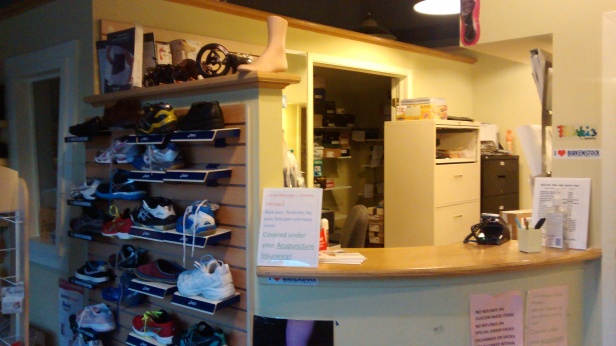
It was so strange; I doubted that I got the right address until she opened the door for me. It was around 7:00 pm and the podiatry clinic itself was closed, but she rented office space here and saw patients whenever she wanted. She was still attending to someone and I waited as I completed my new patient intake forms.
One of the doors to the left led to her office.
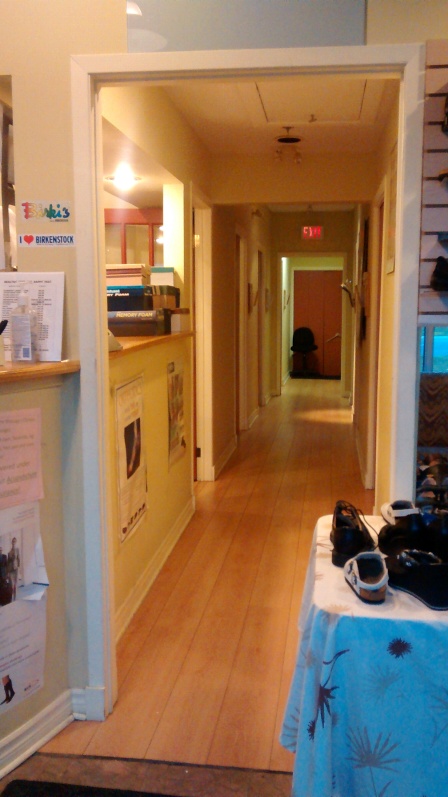
I saw the therapist for an hour at her going rate of $120 per hour. (That’s actually at the lower end of the spectrum; some therapists charge up to $200 per hour.) I first told her about the accident and then how I felt about everything. I was bawling. THE. ENTIRE. TIME. I told her that my doctor had suggested I was depressed and/or overly anxious. She reckoned that “it” sounded more like PTSD.
Although I was glad to talk to someone on the outside without judgement, I was dissatisfied with the visit overall. I didn’t expect to feel 100% better after one appointment, but she only quietly offered minimal advice that I’ve already heard tens of times over.
“It will just take some time,”
“Patience is what you really need,”
“Just think positively,”
I didn’t need to pay $120 to hear that. She suggested that we go through some stress management techniques, like deep breathing, progressive muscle relaxation, visualization, and positive self-talk for my next session.
There weren’t any future sessions.
When I got back home, I ate dinner with my mom but didn’t have the heart to tell her that I went to see a therapist. It was embarrassing. (Maybe the front that was the podiatry clinic was actually good so my brother, who picked me up, wouldn’t know I went to a therapist that night.)
I had always found it easier to talk to my dad than my mom, so I approached him first. He was relaxing on their bed after a long day at work, reading his tablet with the TV in the background. I casually sat next to him and started talking. After saying my third word, I just exploded in tears… for the nth time that day.
He was completely taken aback, not expecting this behaviour from me. “O, ano?!?” (“What?!?”)
“I think I really need help,” I cried. I told him about the Cymbalta that I was prescribed. I told him how hard everything had been for me. Since my dad was active in the religious community, I asked him if he could refer me to someone who offered spiritual counseling.
I then approached my mom and went forward with the same spiel. I saw that it was heartbreaking for her to hear it. We were basically crying together. She offered, “Do you want me to sleep with you for some company and read you the Bible every night?” It was sweet of her, but I politely declined.
Whether I just built up everything inside until that day, or if I hid behind a positive façade all this time, it sure felt good to let it out. I called my husband and mother-in-law to confide in them as well.
That night I took the Cymbalta my doctor prescribed.
***
Were my feelings normal?
Did I actually have some sort of mental disorder that warranted treatment with medication? Five minutes before entering the examination room, I felt normal, then after 15 minutes my doctor told me that I should take anti-depressants.
I had a major life event. I broke my neck in a car accident.
BROKE.
MY.
NECK.
I was newly married with my entire life ahead of me. I had to wear a neck brace for an extended period of time – NEARLY EIGHT MONTHS. I had to get another surgery because the first one didn’t turn out so well. My injury was so bad that I was unknowingly not healing properly for months. I couldn’t do most of the things I loved – work, exercise, being out and about. Although I survived a deathly injury, it was as if my old life had been taken away from me anyway.
I cried when I told Dr. K all this. Wouldn’t you get emotional, too?
Sometimes I cry when I see old friends after a long time and tell them about my accident. The sobfest is usually prompted by them saying, “You’ve been through so much…” I don’t know if I cry out of joy from surpassing the many challenges I have or from not wanting to recall them at all. For example, I’m uncertain if I revel in surviving the halo brace or recoil in disgust.
Nevertheless, I have emotions. Normal people feel things.
What’s not normal is if my feelings inhibited me from living a functional life. If I rather stayed in bed all day and wallowed in despair, then maybe it would have been an issue.
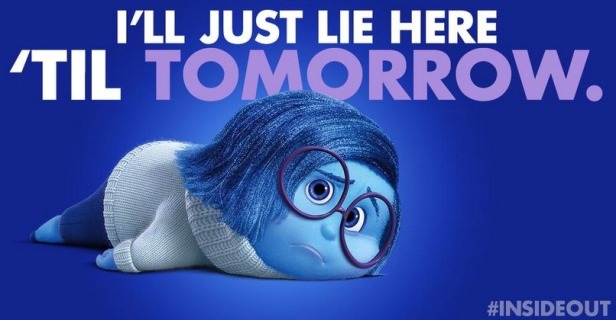
People have all kinds of problems that make them truly depressed or anxious – feeling a mix of emotions at one time, then feeling nothing at all the next, so much so that it interferes with their lives. Fully donning my neck brace, I still went to walk outside, cooked, watched movies, invited friends over to my house, completed insurance paperwork, and learned French. I tried to be as positive as I could be.
As for my possible anxiety disorder, wouldn’t wearing a neck brace 24/7 serve as a constant reminder of how bad you have it? How limited you are? I would say that’s normal. Unable to work for a living, I had to fill my abundant, spare time with activities of all sorts and not worrisome thoughts and feelings. It’s not that I refused to acknowledge that I was anxious about my situation; I simply chose not to dwell on it for too long.
If taking medication was up to me anyway, then why did I still take it?
You know when doctors tell parents to get their kids vaccinated? And then for whatever flavour-of-the-month reason, they don’t, and their kids get sick?
We’re supposed to trust our doctors. We’re told to take mental health issues seriously. “Recognize the signs of bipolar disorder, of depression, of addiction, etc.” But with a quick diagnosis such as mine, you can’t help wondering how rigorous assessments for these conditions are conducted.
I felt sad and cried from recounting my accident and everything I had been through. And then I was labeled “depressed.” While we’re supposed to count on our doctor’s advice, it’s also healthy to doubt it.
Though I have my reservations, I stand by my choice. I’m not a doctor and I’m not educated enough to make medical decisions, so I trusted Dr. K.
I can only be so strong. At that point, maybe I didn’t mind the extra help in the form of medication. When Dr. K brought up that I had a problem, it heightened the bouts of anxiety that I already had about that whole situation about my second surgery. That feeling that it was taking forever to go back to my normal life. That anger that I felt about my neck not healing well when I was doing everything I could. Whether I had a case of depression, anxiety, or PTSD, her diagnosis made me more aware of the negative thoughts lurking in my mind and the fact that I should address them.
I’ve been on the low-dose version of Cymbalta (30 mg) for nearly eight months now. Is it helping me deal with my mental/emotional issues? Maybe. But I certainly don’t attribute my improved mood and emotional state with this alone. I have many other healthy coping mechanisms, especially now that I am completely brace-free and can exercise again. Compared to before, my life is practically perfect.
Several weeks after my one-day nervous breakdown, I explored finding other therapists. But I realized that I didn’t even know what I would say to them anymore. I am strongly considering, however, attending a few sessions of therapy to help me deal with going back to work.
Will I stop taking the pills?
I already have. I finished my prescribed supply a week ago and just quit cold turkey. My doctor said I should experience any withdrawal issues (and thank God, I really haven’t).
I will probably never be certain whether these pills helped save my mental well being during that trying time in my life. But I don’t care – I’m more than okay now.
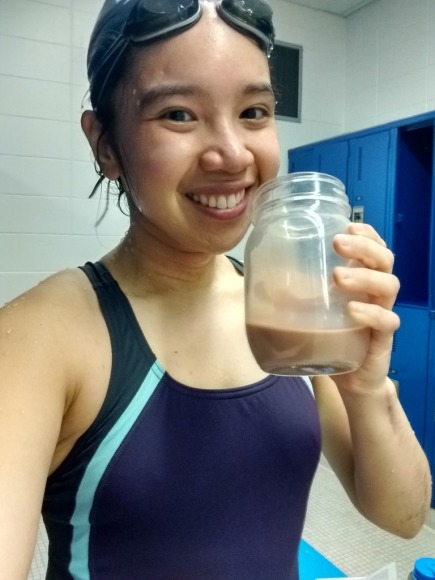
Your a true inspiration to us all. I just received my xrays and visit the orthopedic tomorrow here in Cebu. Now almost 10 weeks in halo and one pin has worked loose which makes movement difficult. All my friends have read your blog and just love your courage and conviction, may you have a long safe and healthy life. By way love your drawing of the car going up hill, helped me so much as has your blog.
LikeLike
(I will continue to assume you are Filipino, hope you understand!)
Ako rin may pin na naging loose (sa likod ng ulo). Tinighten with a wrench, huhu ang sakit pero parang headache lang. But i have read/heard worse… as in blood dripping down their head?! I’m so happy you found and shared my blog, it’s for people like yourself that I write 🙂 I hope you have a safe recovery too.
LikeLike